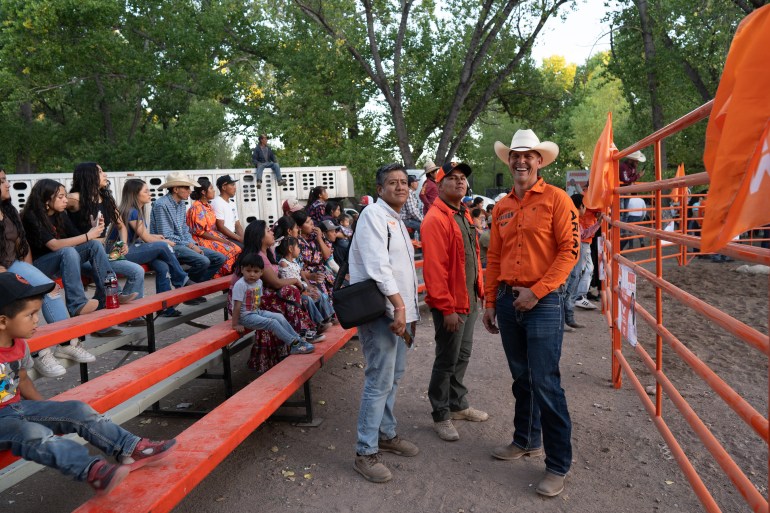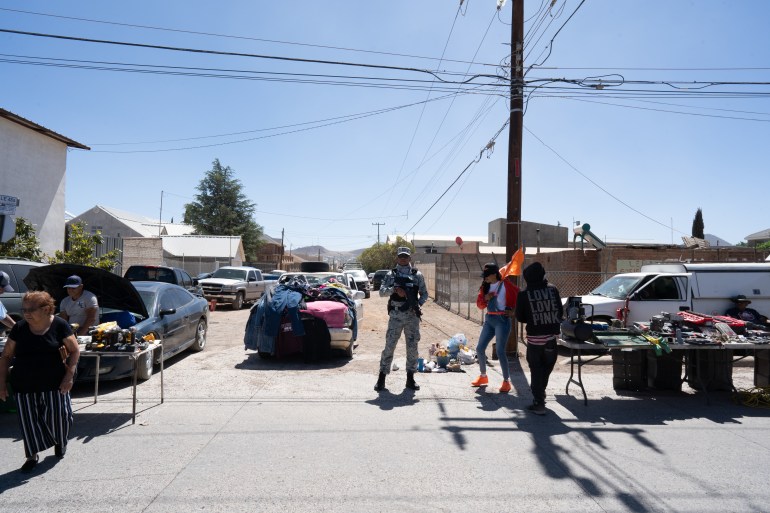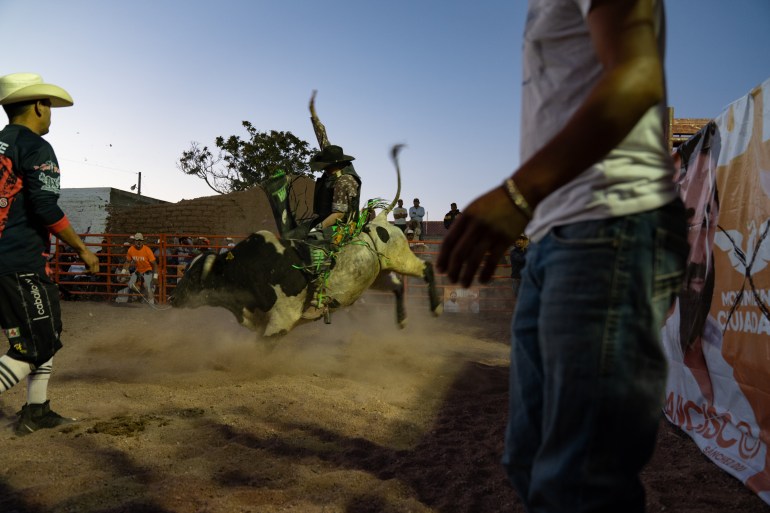How federal agents protect candidates amid Mexico’s elections


Chihuahua, Mexico – “We have to go.” That was all Bryan LeBaron’s security officer needed to say for the congressional candidate to know the situation was serious.
It was May 21, and LeBaron, 47, was in the audience of a mayoral debate at a university sports hall in Nuevo Casas Grandes, Mexico. His wife, Lindi Johnson Berlin, was at his side as they watched his uncle participate.
But the mayoral hopefuls had barely introduced themselves when the moderator cut the discussion short: The premises need to be evacuated, immediately. A security threat had been reported to police.
Members of the audience started to panic, some running to the nearest exits. LeBaron said he overheard the words “men outside with guns”.
He knew to stick close to the head of his security team, agent Antonio Ayala, but in the confusion, his wife had turned in the other direction. He reached over and grabbed her wrist to keep her close.
It was “one of the only times I felt scared during the campaign”, LeBaron explained a few days after the event, from the safety of his headquarters in Cuauhtemoc, a city in the state of Chihuahua.
But it wasn’t the first — and it wouldn’t be the last — time that LeBaron’s safety was threatened during his campaign for a seat in Mexico’s national Congress.

Mexico is currently in the throes of one of its most dangerous election seasons in recent history, and LeBaron is among the dozens of officials who are on Mexico’s front line while competing for votes.
This year’s election, to be held on June 2, is set to be the largest in Mexican history, with more than 20,000 public offices being contested, including every seat in Congress and the presidency.
But bloodshed has marred the campaign season. In the year leading up to the vote, the Mexican civil society organisation Causa en Comun recorded the murders of at least 59 political figures, 34 of whom were candidates or politicians preparing to launch a bid.
The other 25 were officials in other roles, including party representatives. Experts believe drug cartels and criminal networks are most often behind the violence, in an effort to influence the outcome of key local races.
The violence has forced candidates like LeBaron to factor security measures into their campaigns. Agent Ayala, for instance, has become part of LeBaron’s daily life, leading the candidate’s 14-member security team.
Like LeBaron, 185 other federal candidates have been assigned National Guard agents, according to the security information released by the Mexican government on May 27.
Not all National Guard agents have the same background, but Ayala told Al Jazeera he has experience protecting high-profile figures, including former United States President Bill Clinton.
He was originally a member of the Federal Police before the force was folded into the National Guard in 2019. He has also trained as a close protection officer — similar to a bodyguard — and attended courses with international special forces.
So when the mayoral debate on May 21 descended into panic, he knew exactly what to do.
It took less than three minutes to get “el señor Bryan” to safety, said Ayala, whose baby face belies his 11 years of experience.
Officials later revealed two bomb threats had been called in, though no explosives were ultimately found in the debate venue.
In the shadow of tragedy


Over the past few months, daily security incidents have dominated Mexican news, keeping crime and violence at the forefront of voters’ minds in the leadup to June’s election.
A poll from the survey agency Ipsos in March found that 53 percent of Mexican adults ranked crime the “most worrying” topic facing their country, ahead of unemployment, poverty and inflation.
For LeBaron, security is not just an abstract headline. Members of his extended family were involved in a high-profile murder that grabbed international attention less than five years ago.
On November 4, 2019, gunmen fired upon three cars in a remote part of Sonora in northern Mexico, launching two simultaneous attacks. LeBaron’s cousin was driving one of them.
The three drivers, all women, were killed together with six of their children. Several more children survived the incident, which was described as a “massacre” in the media and among residents of LeBaron’s hometown of Colonia LeBaron.
Since the massacre, LeBaron has thrown his energy into activism. But the violence has continued.
Three of LeBaron’s close friends, all fellow activists, have been assassinated in recent years. One, in particular, has weighed on his mind as he launched his political campaign.
Abel Murrieta was the LeBaron family’s lawyer, and in 2021, he was running to become the municipal president in Cajeme, Sonora, when he was shot on a busy street in broad daylight.
In his final interview before he was killed, Murrieta had publicly declared his intention to tackle the area’s security woes.
“I believe that is what got him killed,” LeBaron said, reflecting on the death of his friend.

As an activist, LeBaron tried to pursue justice for families like his that have experienced violence. But, as a political candidate, he said he has to be more careful.
He drives past members of organised crime groups on a daily basis in his home state. Campaigning too heavily on security could be tantamount to declaring a war in his hometown, LeBaron said.
This is LeBaron’s first attempt to win public office. He hopes to win a seat in the federal Chamber of Deputies, where he would represent District Seven, one of nine in the border state of Chihuahua.
Talking during a rare moment at home during the campaign, LeBaron said his team rated their chances of winning as “very low”, given that he had no political experience.
To be successful, LeBaron would have to unseat Patricia Terrazas Baca, for the conservative National Action Party (PAN).
A right-leaning member of the Citizens’ Movement party, LeBaron hopes to strike a contrast with Terrazas Baca, framing himself as a more accessible, community-focused politician.
At each of his rallies, LeBaron asks the crowd, “Who here can name your representative for federal Congress?” The question is typically met by a sea of blank faces.
“Most people we have visited have said the same thing: ‘You are the first politician to visit us,’” LeBaron told a crowd of supporters on a makeshift stage on the back of a tractor-trailer in the small town of Santa Isabel, in the final few days of the campaign.
A break from the past


The border state of Chihuahua has been LeBaron’s home for generations. Like other members of his family, he enjoys dual United States-Mexican citizenship: His childhood was split between Mexico and the US.
Unfortunately, Mexico’s border regions can also be a target for cartel activity, as criminal groups smuggle people and drugs across the international boundary.
Over the past four years, LeBaron has repeatedly taken aim at the governing party, Morena, led by outgoing President Andres Manuel Lopez Obrador, a populist.
On the day of the bomb threat, for instance, he addressed Lopez Obrador on social media, writing, “Mexico is like this outside of the [presidential] palace.”
LeBaron has also filed various lawsuits against the president and his administration, including for allegedly underreporting the number of homicides, attacking the media and preventing access to information in the case of former Defence Minister Salvador Cienfuegos, an army officer accused of protecting drug cartels.
Under Lopez Obrador, crime has remained persistently high. The year before he took office, in 2017, the national homicide rate breached 30,000 for the first time, and it has remained above that high watermark since.
Additionally, an estimated 50,000 people have been registered as missing during Lopez Obrador’s term, according to statistics the National Register of Missing Persons (RNPDNO) released in May.
A week after the bomb threat disrupted the mayoral debate, LeBaron and other Citizens’ Movement candidates returned to Nuevo Casas Grandes to hold a rally.
They balanced precariously on the back of a trailer, as they led a caravan of cars on a parade into the town. Supporters honked their horns and waved flags in the party’s trademark orange.
As LeBaron waved at the passing cars, Ayala held onto one of the trailer’s speakers, his team driving nearby in separate vehicles.
Arriving at the town square for the rally, the event's host, a professional MC, warmed up what he later described as a 4,000-strong crowd.
“We all carry injuries from childhood. But here in Mexico, we carry political injuries caused by previous political parties,” the host shouted from beneath a billboard-sized poster of LeBaron’s smiling face.
Campaigning off the beaten track


Much of LeBaron’s district consists of remote towns, deep in the mountains of western Chihuahua, reachable by dirt roads running through thick forest or rocky terrain.
Along these roadways, far from major towns, small units of armed men — likely working with criminal groups in the area — form checkpoints to stop passing vehicles, standing with their weapons in their hands and radios strapped to their chest.
LeBaron has had frequent reminders of the risks of travelling in these areas. In the leadup to the official campaign season, on January 27, two of his wife’s cousins were kidnapped in Mesa del Huracan, part of District Seven.
They were tortured and released only when their kidnappers were persuaded that they were not spies for an enemy group.
Later, in April, LeBaron said he was leaving a campaign stop when his team received an anonymous message over the phone about another kidnapping.
“This man says he works with your uncle. Either you identify him,” the caller said, “or we’re taking him out.”

After a few frantic messages to members of his community, LeBaron was able to confirm that the kidnapped person did indeed work on his uncle’s ranch — and was not a member of an opposing crime group. He, too, was ultimately released.
LeBaron admits he has been careful about how he approaches public safety proposals in his campaign, for fear of reprisals.
His security policies include advocating for a living wage for law enforcement and free access to legal advice for the police, who currently have to mount their own defence after use-of-force incidents.
He also hopes to create a system of “citizen liaisons to improve the image and the confidence that society has towards law enforcement, with increased budget for security for law enforcement at all three levels of government”, he said.
As well as supporting law enforcement, LeBaron wants to see “better anticorruption controls” and “stronger punishments for abuses of power”, which he considers tantamount to “treason”.
Shifting security plans


When LeBaron was first allocated a security team, he was reluctant. He refused to even let Ayala drive. “I underestimated him,” he said.
Nowadays, though, LeBaron admits he leans on his security team. Agent Ayala is never far away, watching for danger.
Ayala explained that the only time the security team stands down is when LeBaron campaigns in remote areas where the presence of the National Guard would likely cause a confrontation with local cartels.
Not all the safety threats come from organised crime, though. During one event, LeBaron and 700 others rode on horseback into a town, and Ayala’s quick reactions prevented a thick tree branch from falling on Johnson Berlin, LeBaron’s wife.
Wearing a short-sleeved, immaculately ironed shirt, Ayala explained that his job is to be flexible, facilitating but not impeding the candidate’s campaign. That means plans are made — and altered — on the fly.
“Running security on the campaign trail differs from normal VIP protection,” Ayala said.
“Everything changes. We have to be ready at all times without the luxury of planning primary, secondary and tertiary routes that come with standard diplomatic protection.”
Ayala points out that many high-level politicians have tightly wrought schedules to structure their day, organised with the help of a large staff. Protecting candidates like LeBaron, however, requires more fluidity.
The protection teams aren’t always successful, though. On the final day of campaigning, Jose Alfredo Cabrera, a candidate in Guerrero, was assassinated despite having a National Guard security team.
Ayala blamed new protocols for creating security weaknesses. He said they require the National Guard agents to be in uniform and stand at a distance from the candidates.
The new rules “do not respect the usual bodyguard protocols that require you to be as close to the principal as possible at all times”, he explained.
Ayala also underscored the need to adapt when on the road with candidates, something he feels the new rules do not accommodate.
“When there is no agenda, you have to do everything in the moment. Usual protocols, such as not driving at night, no longer apply,” he said.

Ayala’s ability to adapt was tested one last time when LeBaron left the final rally of his campaign at 11pm in Matachi, an area known to be particularly dangerous.
During the course of the event, Ayala had received intelligence that armed men, in about 20 vehicles, were patrolling the surrounding streets.
The two-hour drive back to LeBaron’s home was going to be dangerous. Time was of the essence: every second in the open was a second in danger.
Previously, LeBaron had always insisted on breaking protocol to sit in the front, but now, he followed the agent’s instructions to sit in the back with his wife. Two National Guard trucks sandwiched the candidate’s vehicle.
As they drove, Johnson Berlin noticed a truck behaving erratically behind them, its headlights flashing through their rear window. Fear flickered across her eyes as the truck repeatedly tried to overtake the speeding convoy.
On high alert, the National Guard agents aimed their weapons at the truck, the green lasers of their firearms bouncing over the vehicle as it finally passed the convoy and disappeared into the night.
Ayala, LeBaron and the convoy continued to fly across the country roads, with Ayala hugging the lead vehicle, never more than a few feet away. They sped through red lights, hitting speeds of 180 kilometres per hour (120 miles per hour).
But then the chase came to a sudden stop. They needed petrol.
“We’re in the middle of what feels like a high-speed chase when we have to stop for half an hour to get fuel. It’s super inefficient and dangerous,” LeBaron would later remark, having finally made it back to the relative safety of his home.
But the campaign was finally over. There was nothing more for him to do other than wait for the outcome of Sunday’s election — and see where life would take him next.